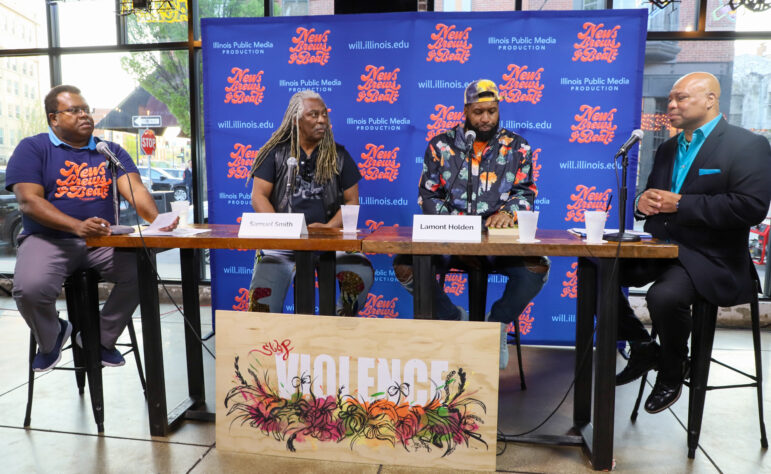With Illinois Soul, WILL creates new format for Black audiences

Illinois Public Media
Illinois Public Media's Jill Clements, left, and Reginald Hardwick talk with Kimberly Schofield, WILL's “Morning Edition” host, about the February launch of Illinois Soul.
Illinois Soul, a new radio format for Black communities in Central Illinois, aims to fill gaps in the local media landscape and audience service of Illinois Public Media.
Developed with extensive input from community leaders and potential listeners, the service launches Feb. 1 with a mixture of music shows, NPR programming and local news and public affairs. Illinois Soul will replace an all-classical service now airing on 101.1 FM and stream a live feed of its programming on Illinoissoul.org. In addition, WILL’s primary FM signal 90.9 will broadcast the service on its HD 2 channel.
The hybrid music/news format of Illinois Soul does not exist anywhere else in the public media landscape, says Jill Clements, assistant corporate support director at IPM.
“We wanted to fill this gap unapologetically and with a sense of urgency because the need was there,” she says.
The Urbana-Champaign region lacks a hub of information for the Black community, which makes up about 15% of the population, says Reginald Hardwick, director of news and public affairs at Urbana-based IPM, which operates public radio and TV stations licensed to the University of Illinois.
Hardwick arrived at IPM just before the start of the COVID-19 pandemic and the racial justice movement that sprang from the murder of George Floyd. “The racial reckoning in America, in the media and in public media was a long time coming,” he says. “As I talked to the Black community, I found out there were no Black newspapers in Central Illinois; the Black-owned radio station had shut down…, and there was nowhere for people to broadly talk with each other.”
WBCP-AM in Urbana, co-owned by the late J.W. Pirtle, was known for its focus on the Black community and as a home for gospel music. Pirtle, a former member of Champaign City Council, hoped to sell the station to a local owner in 2018, according to local news accounts. WBCP’s license expired in 2020, one year after Pirtle died.
In late 2021, Clements and Hardwick began working with Tracy Parsons, a Champaign County Community Coalition facilitator and community relations manager for the city of Champaign, to launch “News, Brews & Beatz,” a forum for tackling pressing issues in the Black community. The first event focused on gun violence — a national problem that was affecting the local community — and featured a discussion among African American experts. Subsequent panels discussed mental health, education and parenting, among other topics. Some were recorded for IPM’s WILL-TV and posted on its YouTube channel.

Attendance at the events was standing-room-only. Hardwick was certain IPM could expand on this success. “My question was, ‘What are we doing all the time to elevate Black voices?’ he says.
That question was on Moss Bresnahan’s mind too. As IPM executive director, Bresnahan says he had been thinking about how the stations could reach and serve people of color.
“This is something unique – it’s where Black media meets NPR,” he says of Illinois Soul. “I think it’s going to emerge as a whole new format for public radio. I fully expect it to be listened to by [people of] all races and backgrounds. It’s here for everybody. It’s important to emphasize that this is focused on celebrating Black voices, Black culture and Black history.”
Engaging with the community
Research and development of Illinois Soul took all of 2023 and engaged stakeholders and potential audience members. IPM’s Black staff members played key roles and a new community advisory board of 12 Black leaders drawn from local governments, higher education institutions, businesses and civil rights organizations participated in planning. The board weighed in on survey research, issues of importance in the Black community, scheduling decisions and the choice of Illinois Soul as the brand name.
“The importance of the advisory group is that you have diverse perspectives that are giving input and thought about things they want to hear. Yet the common narrative, although it’s not monolithic, it’s a community,” says Shandra Summerville, a community advisory member who works as a cultural and linguistic competence coordinator for Champaign County Mental Health and Developmental Disabilities. “This is an opportunity for Black voices, in particular, to be heard in a way that may not have ever been heard before or hadn’t been heard in a long time.”
Parsons, co-host of News Brews & Beatz, also serves on the Illinois Soul community advisory board. He says the level of engagement with the board — and the value IPM assigned to its input — have been exceptional.
“Along the entire way, the community advisory board has been a full participant,” he says. “That’s unique and rare. That’s what’s so cool about Illinois Soul.”
Elevating ‘voices and culture’
IPM hosted numerous outreach events and listening sessions to discover what was important to potential listeners.

Clements says they did their “homework” and took to heart the community’s feedback. An IPM press release describes Clements as an “internal driving force” in creating the new service.
Participants in the listening sessions asked for music programs and public affairs shows that address issues such as mental health and entrepreneurship. They also saw an opportunity for IPM to create a youth media program.
Illinois Soul’s schedule is 80% music. The playlist mixes R&B, gospel and jazz. A majority of respondents to community survey said they wanted programs featuring old-school R&B and soul music. Jazz and gospel also ranked high in their preferences.
The schedule also features original programs from IPM’s Black hosts and producers, such as a new public affairs show, local daily newscasts and segments from “News, Brews & Beatz,” which will become an exclusive program of Illinois Soul. National programs from NPR that feature Black hosts — It’s Been a Minute, Code Switch and Jazz Night in America — will air weekly. NPR’s Morning Edition and Weekend Edition are also in the schedule.
“This is the work of really doing something that elevates voices and culture,” Hardwick says. “We’re bundling it all together. It’s a one-stop shop — you can listen to music, hear some discussions, hear what’s going on in other parts of the country, and hear what’s going on in Urbana-Champaign.”
Growing an audience
Illinois Soul aims to attract and serve an audience of African American adults aged 30 and over, says Clements.
Its launch comes on the heels of Nielsen’s 2023 Audio Today report on listening by Black consumers. The research analysis found that 89% of Black adults ages 25–54 listen to AM/FM radio each month. Radio led all audio sources of daily listening by Black adults aged 18 and above, and most of this listening happened in their cars.
As Summerville sees it, Illinois Soul offers “an opportunity for public media to begin to actually reach and show much more representation of who is listening to the radio. It’s an opportunity to showcase voices and begin to expand our view of how our country is represented now.”
“We are going to create a whole new audience and a new way of receiving information in the Black community that moves us into 2024 and beyond, versus how we’ve gotten news in the past or how we receive information even now,” says Parsons. “When you talk about nationally syndicated programming and blending that with a local community affairs show with ways for the local community to be involved, that’s pretty powerful.”
Clements says Illinois Soul also has the potential to inspire a whole new generation of public media talent.
“If you have people that sound like or are talking about the things that resonate with you, it might really inspire young people to get into radio,” she says. “It’s very important that you see yourself and hear yourself because it means you matter — that you count.”
‘A huge step forward’
IPM wasn’t able to acquire a new signal for Illinois Soul, so the team got creative in reimagining how to use WILL’s existing FM channels, Bresnahan says. The all-classical music station currently airing on 101.1 FM will remain available as a 24/7 classical stream at will.illinois.edu, and 90.9 FM will continue to split its schedule between NPR News and classical music.

“In terms of trade-offs, it’s a huge step forward for us,” he says.
“We saw in the community there was a need that the commercial marketplace wasn’t meeting,” Bresnahan adds. “That’s an essential part of our mission — to step up and meet a need like this. One of our goals is to drive diversity and better reflect the population of Illinois as a whole — both in our listenership and the stories we cover. That’s how we ended up here.”
IPM reorganized to recruit new staff for Illinois Soul. A retirement enables IPM to hire a manager for Illinois Soul, and the newsroom will add a host/producer for the new public affairs show. Music programming will be produced/hosted by IPM staff and freelancers. IPM also upgraded a radio studio for Illinois Soul and purchased music scheduling software and related equipment.
IPM expects to break even on Illinois Soul’s launch and operations within two years, Bresnahan says. “We are still actively seeking funding to invest in the kind of local programming and engagement we aspire to do,” he adds. “We hope to raise at least another $750,000 during the first year of operations to grow our local music and informational programming, and even more after that.”
In preparation for Illinois Soul, IPM staff participated in mandatory diversity, equity, and inclusion training and racial justice discussions. The goal was to undertake that internal work so all employees understood what was being created, along with the thinking behind the programming that Illinois Soul will bring to the community, Clements says.
“It was a discussion about different ways to look at things and hear each other out, which is really lacking in America, period,” says Hardwick. “We were intentional on every level as much as we could be.”
Paths to success
Illinois Soul launches Feb. 1, the first day of Black History Month. Once the service is on-air and online, talking to listeners about how public media works will be essential for building a sustainable funding model, Hardwick says.
“It doesn’t seem like public media has been for us [Black people],” he says. “And so, we may not be familiar with why we do fund drives — it might just sound like something annoying. We have to explain to the public what public media is — meeting their needs and wants, but also advising them that they will have to help us fundraise and get resources for that.”
Bresnahan describes Illinois Soul as a promising opportunity to diversify IPM’s donor base. The fundraising team is seeking “founding” major donors, business sponsors and foundations committed to supporting media for a Black audience. “From an underwriting perspective, Illinois Soul is perfect for businesses that wish to reach diverse audiences,” he says. “There is nothing else like Illinois Soul in this region.”
Hardwick hopes that Illinois Soul will open new paths for community engagement — listeners who share story ideas, politicians who go on-air to speak to the Black community, programs that feature local artists and, eventually, a youth media program.
“For public stations, we’re in the kind of moment where people are asking, are we just going to do an inflection point after George Floyd?” he says. “Or are we really going to do the work to change and capture other perspectives? We’re beginning to do that — it’s just the start.”
To Clements, success will come through the longevity of Illinois Soul. “That means that even when the regime changes and people come and go, this place is still here for the community,” she says.






This is fantastic! Well done Reginald!